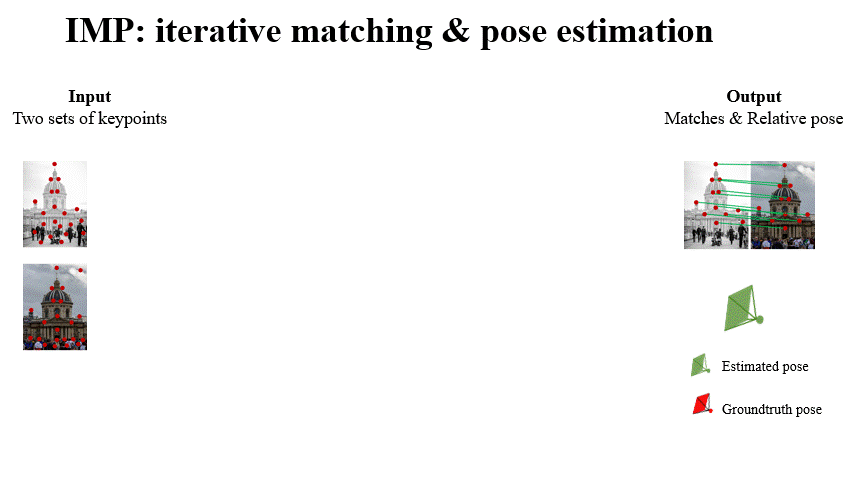In this paper we propose an iterative matching and pose estimation framework (IMP) leveraging the geometric connections between the two tasks: a few good matches are enough for a roughly accurate pose estimation; a roughly accurate pose can be used to guide the matching by providing geometric constraints. To this end, we implement a geometry-aware recurrent attention-based module which jointly outputs sparse matches and camera poses. Specifically, for each iteration, we first implicitly embed geometric information into the module via a pose-consistency loss, allowing it to predict geometry-aware matches progressively. Second, we introduce an efficient IMP, called EIMP, to dynamically discard keypoints without potential matches, avoiding redundant updating and significantly reducing the quadratic time complexity of attention computation in transformers.
With this code, you can train your own matcher from scratch with better performance than SuperGlue. As a trained model supports different number of iterations (self/cross), you can choose a light version with fewer layers for easy tasks, e.g., VO/SLAM and a heavy version with more layers for tough tasks such as long-term relocalization.
-
Full paper PDF: IMP: Iterative Matching and Pose Estimation with Adaptive Pooling.
-
Authors: Fei Xue, Ignas Budvytis, Roberto Cipolla
-
Website: imp-release for videos, slides, recent updates, and datasets.
- Python==3.9
- PyTorch == 1.12
- opencv-contrib-python == 4.5.5.64
- opencv-python == 4.5.5.64
Please download the preprocessed data of Megadepth (scene_info and Undistorted_SfM) from here.
The data structure of Megadepth should be like this:
- Megadepth
- phoenix
- scene_info
- 0000.0.npz
- ...
- Undistorted_SfM
- 0000
- images
- sparse
- stereo
Then Use the command to extract local features (spp/sift), build correspondences for training:
python3 -m dump.dump_megadepth --feature_type spp --base_path path_of_megadepth --save_path your_save_path
The data structure of generated samples for training should like this:
- your_save_path
- keypoints_spp
- 0000
- 3409963756_f34ab1229a_o.jpg_spp.npy
- matches_spp # not used in the training process
- 0000
- 0.npy
- matches_sep # this is used for loading data with multi-thread (tried h5py, but failed)
- 0000
- 0.npy
- nmatches_spp # contains the number of valid matches (used for random sampling in the training process)
- 0000_spp.npy
- mega_scene_nmatches_spp.npy # merged info of all scenes in nmatches_spp
Instead of generating training samples offline, you can also do it online and adopt augmentations (e.g. perspective transformation, illumination changes) to further improve the ability of the model. Since this process is time-consuming and there might be bugs in the code, it would be better to do a test of dumping and training on scenes in assets/megadepth_scenes_debug.txt .
Please modify save_path and base_path in configs/config_train_megadepth.json. Then start the training as:
python3 train.py --config configs/config_train_megadepth.json
The base_path in configs/config_train_megadepth.json should be the same as the save_path used in dump_megadepth . It requires 4 2080ti/1080ti gpus or 2 3090 gpus for batch size of 16.
-
Download the pretrained weights from here and put them in the weights directory.
-
Prepare the testing data from YFCC and Scannet datasets.
- Download YFCC dataset:
bash download_data.sh raw_data raw_data_yfcc.tar.gz 0 8
tar -xvf raw_data_yfcc.tar.gz
- Update the following entries in dump/configs/yfcc_sp.yaml and dump/configs/yfcc_root.yaml
- rawdata_dir: path for yfcc rawdata
- feature_dump_dir: dump path for extracted features
- dataset_dump_dir: dump path for generated dataset
- extractor: configuration for keypoint extractor
cd dump
python3 dump.py --config_path configs/yfcc_sp.yaml # copied from SGMNet
You will generate a hdf5 (yfcc_sp_2000.hdf5) file at dataset_dump_dir. Please also update the rawdata_dir and dataset_dir in configs/yfcc_eval_gm.yaml and configs/yfcc_eval_gm_sift.yaml for evaluation.
-
Download the preprocessed Scannet evaluation data from here
-
Update the following entries in dump/configs/scannet_sp.yaml and dump/configs/scannet_root.yaml
- rawdata_dir: path for yfcc rawdata
- feature_dump_dir: dump path for extracted features
- dataset_dump_dir: dump path for generated dataset
- extractor: configuration for keypoint extractor
cd dump
python3 dump.py --config_path configs/scannet_sp.yaml # copied from SGMNet
You will generate a hdf5 (scannet_sp_1000.hdf5) file at dataset_dump_dir. Please also update the rawdata_dir and dataset_dir in configs/scannet_eval_gm.yaml and configs/scannet_eval_gm_sift.yaml for evaluation.
- Run the following the command for evaluation:
python3 -m eval.eval_imp --matching_method IMP --dataset yfcc
You will get results like this on YFCC dataset:
| Model | @5 | @10 | @20 |
|---|---|---|---|
| imp | 38.45 | 58.52 | 74.67 |
| imp_iterative | 39.4 | 59.62 | 75.28 |
| eimp | 36.96 | 56.76 | 73.29 |
| eimp_iterative | 38.98 | 58.95 | 74.81 |
If you use any ideas from the paper or code in this repo, please consider citing:
@inproceedings{xue2022imp,
author = {Fei Xue and Ignas Budvytis and Roberto Cipolla},
title = {IMP: Iterative Matching and Pose Estimation with Adaptive Pooling},
booktitle = {CVPR},
year = {2023}
}
Part of the code is from previous excellent works including SuperPoint , SuperGlue and SGMNet. You can find more details from their released repositories if you are interested in their works.
